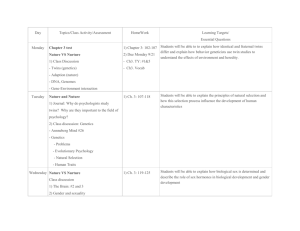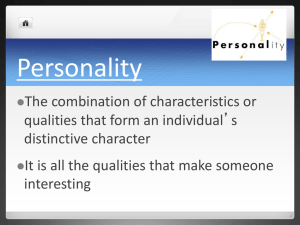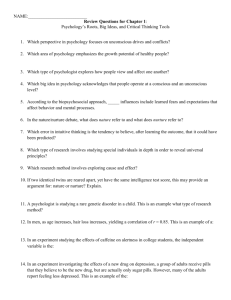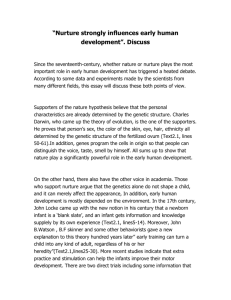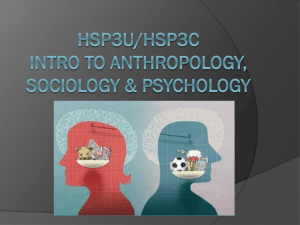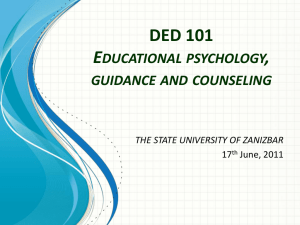NURTURE STRONGLY INFLUENCES EARLY HUMAN
advertisement
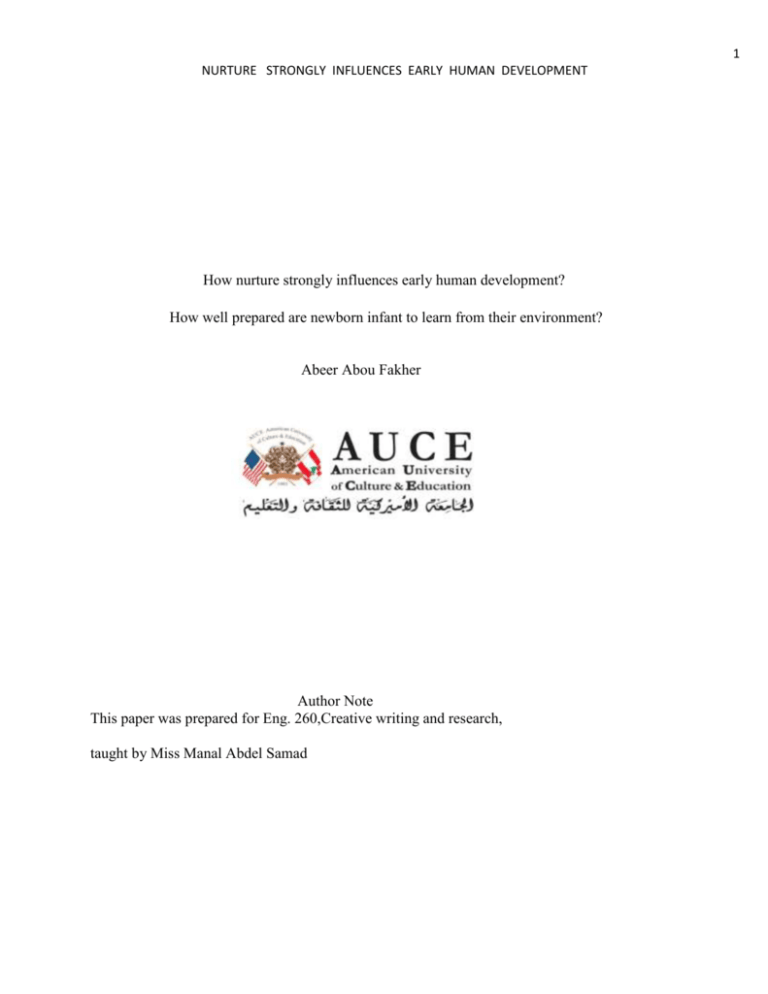
1 NURTURE STRONGLY INFLUENCES EARLY HUMAN DEVELOPMENT How nurture strongly influences early human development? How well prepared are newborn infant to learn from their environment? Abeer Abou Fakher Author Note This paper was prepared for Eng. 260,Creative writing and research, taught by Miss Manal Abdel Samad 2 NURTURE STRONGLY INFLUENCES EARLY HUMAN DEVELOPMENT Abstract There have been many discussions about the main influences on early human development throughout history, and even now. This research reviews the "nature" and the "nurture" theories of human behavior examine a couple of approaches of the way scientists look at them. Some scientists think that people behave as they do according to genetic explanation or even "animal instincts." This is known as the "nature" theory of human behavior. Other scientists believe that people think and behave in certain ways because they are taught to do so. This is known as the "nurture" theory of human behavior. And this research going to show who environment is more important than genes when it comes to intelligence. And how newborn infants enter the world with all sensory systems functioning and are well prepared to learn about their new environment. 3 NURTURE STRONGLY INFLUENCES EARLY HUMAN DEVELOPMENT How nurture strongly influences early human development? How well prepared are newborn infant to learn from their environment? the seventeenth-century British philosopher John Locke rejected the existing belief of his day that babies were small adults who arrived in the world fully prepared with abilities and knowledge and who simply had to grow in order for these inherited characteristics to appear. On the contrary, Lock believed that the mind of newborn infant is 'blank slate'-what he or she sees, hears, tastes, smells and feels. According to Lock, all knowledge comes to us through our senses. It is provided by experience; no knowledge or ideas are built in. In the other hand Nature behavior is best described as the behavior that we are born with. It remains unchanged and is often instinctive. It is usually an involuntary response to a stimulus, just like blinking your eye when it is blown on. While nature produces healthy, well-formed infant’s body (sex, color of skin, eyes…). Nurture helps in developing them in the early stages of their lives through practice and experience besides the sensory system. By responding to the following questions: 1-What are the overall ideas about nature vs. nurture? 2-Is it important to find out how is behind the effects in early human development? 3-When interaction between nature and nurture could happen? 4-how does newborn capacities developed through time ? We'll better understand that the early development of a human is more effective and faster by nurture comparing to what comes out of nature. Some philosophers like John Locke and 4 NURTURE STRONGLY INFLUENCES EARLY HUMAN DEVELOPMENT Aristotle, believed that humans' thoughts and actions were determined not by innate factors, but by their unique experiences. What are the overall ideas about nature vs. nurture? The advent of Charles Darwin's theory of evolution (1859),which emphasizes the biological basis of human development ,led to a return of the hereditarian viewpoint. With the rise of behaviourism in the twentieth century, however, the environmentalist position once again gained dominance. Behaviourists such as John B. Watson and B.F. Skinner argued that human nature is completely malleable : early training can turn a child into any kind of adult, regardless of his or her heredity. Watson stated the argument in its most extreme form : 'Give me a dozen healthy infants, well-formed, and my own specified world to bring them up in, and I'll guarantee to take any one at random and train him to be any type of specialist I might select –doctor, lawyer, artist, merchant-chief, and yes, beggar-man and thief, regardless of his talents, penchants, tendencies, abilities, vocations, and race of his ancestors' (1930, p. 104). Plato theorized that all knowledge is present at birth. Plato also believed that the environment played a part in human processes, but he thought it had a unique role. He believed the environment did not teach people anything new, but its purpose was to remind people of information they already knew (Cowie, 1999). Although Plato's views are not supported today, he laid the groundwork for other researchers to follow. Alternatively, philosopher Aristotle theorized a different idea about human behavior. He presented the idea that humans are born into the world with a "blank slate" and people's behavior and thoughts are due to experience (Ashcraft, 1998). Unlike Plato, Aristotle hypothesized that humans were not born with knowledge, but they acquire it through experience (Ashcraft, 1998). Aristotle's idea of the tabula 5 NURTURE STRONGLY INFLUENCES EARLY HUMAN DEVELOPMENT rasa is not believed today. Nevertheless, his belief that the environment was a vital factor in behavior influenced many empiricists throughout history. Is it important to find out how is behind the effects in early human development? Parents have always been captivated by the rapid growth and development that characterize the earliest years of their children's lives. Which all children go through the same sequences of growth and development in the same order right from their mother’s womb; the development of parts of the body and organs, motor development after birth, development of speech, etc.. Nature leads to ordinary development of a fetus into a human, but it cannot develop an infant into a healthy-minded or a sportive adult, which an infant can gain only through his/her experience .So, Environmental factors that a woman is exposed to during pregnancy, such as maternal malnutrition, rubella or German measles, or using drugs or alcohol, which can affect the normal maturation of the fetus. Moreover, the newborn infants enter the world with all sensory systems functioning and are born marvelously primed to receive and respond to sensory stimuli..

